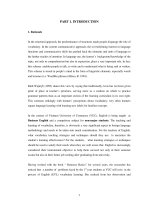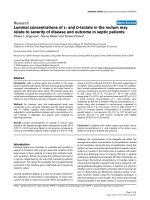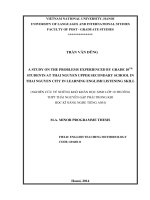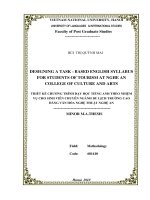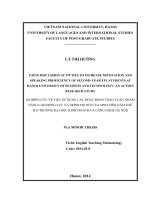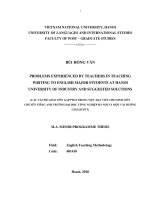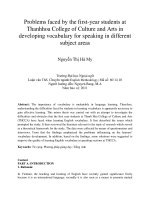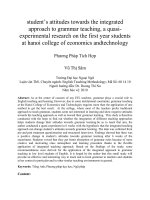Problems faced by the first-year students at Thanhhoa College of Culture and Arts in developing vocabulary for speaking in different subject areas
Bạn đang xem bản rút gọn của tài liệu. Xem và tải ngay bản đầy đủ của tài liệu tại đây (148.6 KB, 5 trang )
Problems faced by the first-year students at
Thanhhoa College of Culture and Arts in
developing vocabulary for speaking in different
subject areas
Nguyễn Thị Hà My
Trường Đại học Ngoại ngữ
Luận văn ThS. Chuyên ngành:English Methodology; Mã số: 60 14 10
Người hướng dẫn: Nguyen Bang, M.A
Năm bảo vệ: 2011
Abstract: The importance of vocabulary is undeniable in language learning. Therefore,
understanding the difficulties faced by students in learning vocabulary is apparently necessary to
gain effective learning. This minor thesis was carried out with an attempt to investigate the
difficulties and obstacles that the first year students at Thanh Hoa College of Culture and Arts
(THCCA) have faced when learning English vocabulary. It first described the issues which
prompted the study. It then reviewed the literature relevant to the topic of research which served
as a theoretical framework for the study. The data were collected by means of questionnaires and
interviews. From that the findings emphasized the problems influencing on the learners’
vocabulary development. In addition, based on the findings, some solutions were suggested to
improve the quality of learning English vocabulary in speaking sections at THCCA.
Keywords: Từ vựng; Phương pháp giảng dạy; Tiếng Anh
Content
PART A: INTRODUCTION
1. Rationale
In Vietnam, the teaching and learning of English have recently gained significance firstly
because it is an international language; secondly it is also seen as a means to promote mutual
understanding and cooperation between Vietnam and other countries, especially since Vietnam
has became an official member of WTO. It has an increasing number of people desiring to know
English with the hope of keeping up with the latest modern technology in the world. English has
now been taught at all universities and colleges, and it is considered as a compulsory subject at
secondary school.
At THCCA, where the author carries out the research, English is a compulsory subject in the
curriculum. It is taught with the purpose that students have some basic knowledge of English in
order to communicate well. To achieve this aim, speaking skills should be focal content of
English language teaching. However, there still exist many difficulties facing English language
teachers in Vietnam in general and those in THCCA in particular. In reality they find it difficult
to teach speaking successfully.
Many students who have good knowledge of grammar and can do well at reading and writing
tasks but can not express themselves in spoken English. In fact, in real-life situations, students
find it hard to communicate with English speaking people.
Being a teacher of THCCA, the researcher found that one of the main reasons why students are
not positive in English is that they do not have adequate vocabulary. In fact they are provided
with almost every word necessary for their learning and their communication outside the
classroom, but for some certain reasons, these words are not appropriately used. Many of my
students complain that they learn a lot of new words, but they soon forget most of them. There
may be problems in their ways of learning vocabulary and problems in teaching it.
All of the above reasons have inspired the author to carry out a research on “Problems faced by
the first-year students at Thanh Hoa College of Culture and Arts in developing vocabulary for
speaking in different subject areas” with the hope of making a small contribution to finding out
some problems students at THCCA have met with when they use vocabulary in English speaking
activities and some suggested solutions to the problems are provided as well.
2. Aims of the study
This study aims at finding out the difficulties that the first year students at THCCA have faced
with in learning vocabulary for speaking skills. To fulfill this aim, the following objectives
are established:
+ Surveying the current learning situation at THCCA by delivering questionnaires and
interviews to the participants. Then analyzing the collected data from the participants and
evaluating the results from the surveyed data.
+ Giving some solutions to the development of vocabulary learning.
From these, the researcher tries to give some recommendations to teach vocabulary more
effectively.
3. Research questions
To achieve the objectives of the study, the following questions were raised:
1. What is the reality of learning vocabulary in speaking skills at THCCA?
2. What difficulties have the first year students at THCCA faced with in developing
vocabulary for speaking skills?
3. What techniques should be applied to improve vocabulary learning for speaking
skills?
4. Scope of the study
The study is limited to the area of learning vocabulary in the current learning materials for the
first year students at THCCA. This minor thesis deals with the common problems which students
have met, and basing on these problems, some effective and feasible solutions will be provided.
5. Methodology
In order to find out the answers to the research questions, this study is to be conducted as a
descriptive study that utilizes both quantitative and qualitative approaches. The quantitative
analysis is employed through the process of data collected from written questionnaires and the
qualitative approach is used to deal with the data collected from interviews with the teaching
staff and the first year students that are fully responsible for the teaching and learning English
vocabulary in speaking sections in the learning material “Lifeline-Elementary” for speaking
skills. The combination of these data collection methods will help ensure both reliability and
validity of the study.
6. Design of the study
This study consists of three parts: Introduction, Development and Conclusion.
Part A: Introduction presents the rationale, the aims and objective, the scope, the methods
and design of the study.
Part B: Development
The development comprises three chapters:
+ Chapter I provides relevant literature concerning definition of speaking skills and the
role of vocabulary in teaching and learning speaking skills. A brief introduction of the
vocabulary teaching methods is mentioned.
+ Chapter II describes the methods employed in the study and introduces the situations of
learning vocabulary at THCCA.
+ Chapter III presents the data analysis discussion and offers some recommendations for
vocabulary learning at THCCA.
Part C: Conclusion
This chapter gives a brief of description of the study and states the limitations as well as
recommendations for further research.
References
Baker, Ann. (1990). Pronunciation Pairs: An Introductory Course for Students of English.
Cambridge University Press.
Bogaards, P. & Laufer, B. (1997). Vocabulary in a Second Language. UK: CUP.
Brown, G. and Yule, G. (1983). Teaching the Spoken Language. Cambridge: CUP.
Bygate, M. (1987). Speaking. Oxford: Oxford University Press
Byrne, Donn,. (1986). Teaching Oral English. London: Longman.
Carter, Ronald,. (1997). Exploring Spoken English, Cambridge University Press.
Crystal, David,. (1997). English as a Global Language, Cambridge University Press.
Davies, Paul,. (2000). Success in English Teaching, Oxford University Press
.
Doff, A. (1988). Teaching English: A Training Course for Teachers, CUP.
Englewood. (2000). Guide to Language and Study skills for College Students of English as a
Second Language., New York. (A-D41/02488,3993 - 3994)
Kayi, H. ( 2006). Teaching Speaking. The Internet TESL Journal, Vol. XII, No11,
November.
Hutchinson T. (2002). Lifelines - Elementary, Student’s book, Oxford University Press.
Hutchinson T. (2002). Lifelines - Elementary, Workbook, Oxford University Press.
Johnson, Keith,. (1982). Communicative Syllabus Design and Methodology, OUP.
Jack C. Richards and Theodore S. Rodgers. (1986). Approaches and Methods in
Language Teaching. Oxford University Press.
Larsen Freeman, Danie, (1986). Techniques and Principles in Language Teaching.
Oxford: Oxford University Press.
Lewis, M. (1993). The Lexical Approach: The state of ELT and a Way Forward.
(M).Hove, England: Languages Teaching Publications.
Lewis, M. (1997). Implementing the Lexical Approach: Putting Theory into Practice. Hove ,
England: Languages Teaching Publications.
Mackey, W. F. (1971). Language Teaching Analysis. London: Longman
Macmillan English Dictionary for Advanced Learners. (2002).
McCarthy, M. (1990). Vocabulary. Oxford: Oxford University Press.
Nunan, David, (1999). Second Language Teaching & Learning, Boston: Mass.
Nunan, D. (1989). Designing Tasks for the Communicative Classroom. CUP.
Nunan, D. (1998). Language Teaching Method – Teachers book. New Jersey: Prentice Hall
International.
Nunan, D. (1992). Research Methods in Language Learning,
Cambridge University Press
.
Rogerson, Pamela. (1990). Speaking Clearly: Pronunciation and Listening Comprehension
for Learners of English, Student’s book,
CUP.
Revell, Jane,. (1979). Teaching Techniques for Communicative English, OUP.
Pattison, P. (1987). Developing Communication Skills. Cambridge University Press.
Schmitt N. (2000). Vocabulary in Language Teaching, Cambridge University Press.
Wilkins D. (1972). Linguistics and Language Teaching, London: Edward Arnold.
